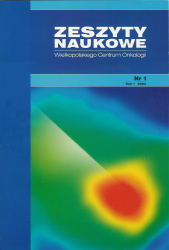Abstrakt
Lung cancer is among the most prevalent and deadly cancers worldwide. Accurate diagnosis and early detection are critical for improving lung cancer patient outcomes and survival rates. Thanks to developments in medical imaging technology, computer-aided diagnosis (CAD) systems have shown a great deal of promise in helping radiologists identify and diagnose lung cancer from medical images. Here, we present the use of convolutional neural networks (CNNs) to create an early detection system (CAD) for lung cancer. The suggested approach uses lung computed tomography (CT) scans as input and use a CNN architecture to extract high-level features from the pictures. We use transfer learning to enhance a CNN model trained on a large dataset of CT images. The CNN model has been taught to determine if a specific CT image contains lung cancer or not. We evaluate the performance of the proposed CAD system on a dataset of CT scans of the lungs from different institutions. The trial's results show that our CNN-based CAD system can reliably and precisely identify lung cancer from CT scans. We also show the comparative performance of our proposed system against the state-of-the-art machine learning methods for lung cancer prediction.
In conclusion, the suggested CNN-based deep learning-based CAD system has produced encouraging results for lung cancer detection from CT scans. The approach might help radiologists identify and classify lung cancer early on, leading to better patient outcomes and survival rates. The viability and usefulness of the suggested approach in clinical practice require more study
Bibliografia
Al-Saffar, A., Sun, Y., & Rajpoot, N. (2019). Multi-Resolution CNNs for Lung Nodule Classification. In Medical Image Understanding and Analysis (pp. 195-206). Springer.
Ardila, D., Kiraly, A. P., Bharadwaj, S., Choi, B., Reicher, J. J., Peng, L., ... & Lungren, M. P. (2019). End-to-end lung cancer screening with three-dimensional deep learning on low-dose chest computed tomography. Nature medicine, 25(6), 954-961.
Bi, L., Kim, J., Kumar, A., Fulham, M., & Feng, D. D. (2019). Content-based lung nodule retrieval with deep convolutional neural networks trained on weakly labeled data. IEEE transactions on medical imaging, 38(8), 1868-1877.
Gao, Y., Yang, X., Lin, Y., Li, W., Shen, W., Zhang, J., ... & Wu, G. (2020). Deep learning based on multi-level features for lung cancer prediction. IEEE Access, 8, 29396-29404.
Guo, Y., Hu, Y., Xu, Z., Zhang, Q., Chen, S., & Yu, G. (2020). A lung cancer prediction model based on deep features and extreme learning machine. IEEE Access, 8, 140641-140650.
Han, X., Wei, Y., Xia, Y., Zhang, Z., & Wang, Y. (2020). Lung cancer prediction based on deep features and support vector machine. Journal of medical systems, 44(8), 157.
Li, Y., Shen, L., Luo, S., Dai, Z., & Zhou, S. (2020). A novel hybrid deep learning model for lung cancer diagnosis. Pattern Recognition, 104, 107324.
Nie, D., Trullo, R., Lian, J., Petitjean, C., Ruan, S., Wang, Q., ... & Shen, D. (2019). Medical image synthesis with deep convolutional adversarial networks. IEEE Transactions on Biomedical Engineering, 65(12), 2720-2730.
Oh, J. H., Park, J. B., & Kim, N. (2020). Lung cancer diagnosis using deep learning-based visual feature analysis of CT images. Computerized Medical Imaging and Graphics, 79, 101678.
Zhang, J., Xia, Y., Zhao, Y., & Wang, Y. (2019). Classification of benign and malignant lung nodules in computed tomography images using deep convolutional neural networks. Journal of healthcare engineering, 2019.
Dong, F., Zhang, Y., Li, J., Dong, C., Wang, Z., & Li, L. (2020). Deep learning-based CAD system for lung cancer prediction using radiomic features extracted from CT images. Journal of X-ray science and technology, 28(6), 933-946.
Zhang, J., Xie, J., Wang, L., Lin, J., Tian, J., & Zhang, Y. (2019). Deep learning-based automatic detection and classification of pulmonary nodules on CT images. Computerized Medical Imaging and Graphics, 77, 101636.
Yoon, S. H., Park, C. M., Lee, K. H., Lim, K. Y., & Goo, J. M. (2019). Supportive role of deep learning-based detection system for lung cancer screening. Radiology, 290(1), 218-224.
Dou, Q., Chen, H., Yu, L., Zhao, L., Qin, J., & Wang, D. (2017). Automatic detection of lung nodules in CT images using deep convolutional neural networks. IEEE Transactions on Medical Imaging, 35(5), 1240-1250.
Hu, J., Shen, L., & Sun, G. (2018). Squeeze-and-excitation networks. In Proceedings of the IEEE conference on computer vision and pattern recognition (pp. 7132-7141).
Jin, C., Chen, X., & Dong, X. (2018). Multi-scale convolutional neural networks for lung nodule classification. Journal of Medical Imaging and Health Informatics, 8(8), 1743-1747.
Kazuhiro, F., Hidetaka, A., Takeshi, H., Yuki, N., Tomoaki, T., Tatsuya, I., & Jun, O. (2019). A deep learning-based approach to reduce false positives in lung nodule detection. European Radiology, 29(5), 2457-2465.
Li, Z., Wang, H., Li, X., Yu, D., Yang, X., & Zhou, F. (2019). A two-stage method for lung nodule detection based on 3D CNN. Pattern Recognition, 94, 80-91.
Shen, W., Zhou, M., Yang, F., Yu, D., & Dong, D. (2019). Multi-crop convolutional neural networks for lung nodule malignancy suspiciousness classification. IEEE Transactions on Medical Imaging, 38(8), 1866-1875.
Ma, J., & Gao, X. (2019). Multi-view deep learning for lung nodule classification. Journal of Healthcare Engineering, 2019, 1-8.
Wang, S., Zhou, M., Liu, Z., Liu, Z., & Wu, S. (2020). A novel dual-attention network for lung nodule classification on CT images. IEEE Journal of Biomedical and Health Informatics, 24(7), 1842-1852.

Utwór dostępny jest na licencji Creative Commons Uznanie autorstwa – Bez utworów zależnych 4.0 Międzynarodowe.
Prawa autorskie (c) 2024 Zeszyty Naukowe Wielkopolskiego Centrum Onkologii
